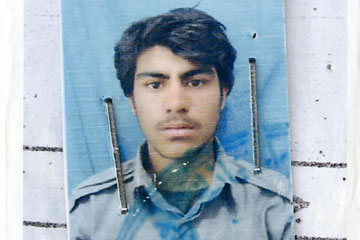
This photocopy of an image of Abdul Razaq, the killer of the three Marines, was given to the writer by a Marine in Helmand.
(5 of 12)
His new commander is diligent, though. He often checks perimeter security personally, guard tower to guard tower, seeing that his policemen stay awake through the starry Helmand nights. But on one of these, 10 Septembers after the attack on the World Trade Center, he is too tired. He tells a newly arrived lieutenant--Asadullah Sherhai, a wiry man, conscientious, from a good family--to go instead.
In the first tower the men are sleeping, and Asadullah wakes them up. As he walks to the second tower, he sees a figure standing outside.
"Who is that?" he calls, and shines his flashlight upon the man.
Abdul Razaq.
They had met in passing when Abdul Razaq signed up in Nawa, but now they live on the same base. Abdul Razaq's black eyes reflect the flashlight's beam, and Asadullah makes an officer's note. This man does not sleep on duty.
Abdul Razaq's policing is undertaken in partnership with a rotating cast of U.S. Marines. Some joint activities are educational, like weekly medical trainings at checkpoints. Others are more dangerous--the pursuit of Taliban cell leaders, opium, IEDs. As one of Sayfullah Khan's bodyguards, Abdul Razaq accompanies him on these missions, and Sayfullah has a reputation for bravery. It is probably a relief for Abdul Razaq to get back to base at day's end for his secondary duty. He is the cook.
Cooking is key to morale and has important implications besides. "Repulsive hygiene" is one of the complaints U.S. servicemen have about their Afghan partners, according to a study commissioned by U.S. Military Command in Jalalabad. The study, "A Crisis of Trust and Cultural Incompatibility," is unclassified until the summer of 2011, when it becomes secret.
It concludes that green-on-blues are a "rapidly growing systemic threat" and are largely a function of misunderstanding and personal grievance. Recurring U.S. complaints include "pervasive illicit drug use, massive thievery, personal instability, dishonesty, no integrity, incompetence, unsafe weapons handling, corrupt officers, no real NCO corps, covert alliances/informal treaties with insurgents, high AWOL rates, bad morale, laziness ... and the torture of dogs."
The Afghan complaints are equally serious: "violating female privacy during searches, U.S. roadblocks, publicly searching/disarming ANSF members as an SOP [standard operating procedure] when they enter bases, and past massacres of civilians by U.S. forces (i.e., the Wedding Party Massacre, the Shinwar Massacre, etc.) ... urinating in public, their cursing at, insulting and being rude and vulgar to ANSF members, and unnecessarily shooting animals."
When the study leaks, the coalition downplays it. No one mentions the overlapping animal complaints. Abdul Razaq will later say he never saw any crimes. What he does see is that he is fighting a very different war than his American partners. Even as the cook. Marines' meals are the same as any institutional spread back in the States, and they patrol with arrays of snacks. Skittles stick to the floor of their humvees in the heat. Abdul Razaq's meals tend toward rice and stew. Asadullah thinks he is nothing special, a pretty common cook.
